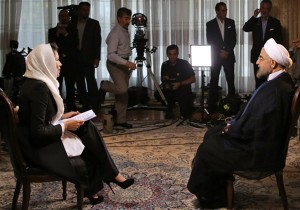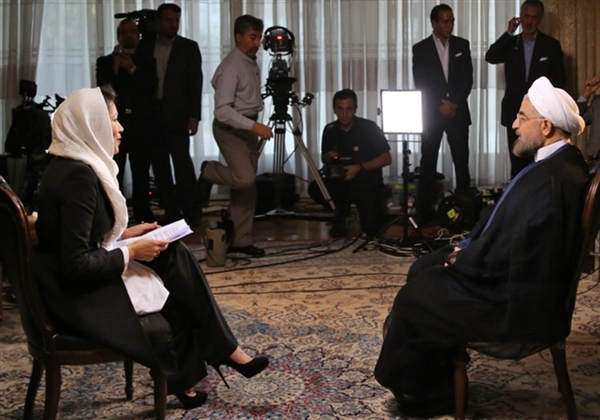 Iran's President Hassan Rouhani is interviewed by Ann Curry in Tehran on Sept. 18, 2013.[/caption]
Iran's President Hassan Rouhani is interviewed by Ann Curry in Tehran on Sept. 18, 2013.[/caption]Iranian President Hassan Rouhani told NBC News on Wednesday that the country will never develop nuclear weapons and that he has the clout to make a deal with the West on the disputed atomic program.
�In its nuclear program, this government enters with full power and has complete authority,� Rouhani told Ann Curry, NBC News national and international correspondent and anchor at large, in his first interview with a U.S. news outlet since his election.
�The problem won't be from our side,� he said at the presidential compound in Tehran. �We have sufficient political latitude to solve this problem.�
Asked whether Iran would ever build a nuclear weapon, Rouhani noted that the country has repeatedly pledged that �under no circumstances would we seek any weapons�of mass destruction, including nuclear weapons, nor will we ever.�
�We have never pursued or sought a nuclear bomb, and we are not going to do so,� he said. �We solely are looking for peaceful nuclear technology.�
Rouhani's comments are the latest in a slew of signs that he is cautiously open to defrosting relations with the U.S., which were in deep freeze under the isolating leadership of his predecessor, the inflammatory Mahmoud Ahmedinejad.
He and President Obama have exchanged letters in which they traded views on �some issues.�
"From my point of view, the tone of the letter was positive and constructive," Rouhani said of the note he got from the White House congratulating him on his June election, in which he defeated five hard-liners.
"It could be subtle and tiny steps for a very important future. I believe the leaders in all countries could think in their national interest and they should not be under the influence of pressure groups. I hope to witness such an atmosphere in the future."
White House spokesman Jay Carney said Wednesday that in the letter, Obama told Rouhani the U.S. is open to a resolution to the nuclear impasse�in which Iran can prove its atomic program is peaceful.
But he also conveyed the need to act quickly because the window for a diplomatic deal "will not remain open indefinitely,� Carney said.
On another pressing topic, Rouhani was questioned about his views on Iran�s close ally Syria and its promise to give up chemical weapons under the threat of air strikes from the U.S.
He said he could give no guarantees on behalf of Syrian President Bashar Assad, just days after he was quoted by his country's official news agency as saying he would accept any Syrian president elected by the people.
�We are not the government of Syria,� he told Curry when asked about the chemical weapons handover. �We are one of the countries of this region which is asking for peace and stability and the elimination of all weapons of mass destruction in the entire region. �
Asked whether he thought Obama looked weak when he backed off the air-strike threat, Rouhani replied, �We consider war a weakness.� Any government or administration that decides to wage a war, we consider a weakness.� And any government that decides on peace, we look on it with respect to peace.�
His answers underscored the shift in Iranian politics since Rouhani was elected with just over 50 percent of the vote. In his�inaugural address, he spoke of engagement with the West to end sanctions over the nuclear program.
"The Iranian people voted 'yes' to moderation," he said in his speech.
Rouhani's appearance next Tuesday at the U.N. General Assembly � where western diplomats regularly stalked out of Ahmedinejad's fiery speeches � should provide more clues to just how moderate he is.
Among recent overtures from his administration: the head of Tehran's nuclear program said Rouhani has a "more full-fledged ... desire" to come to an agreement on nukes than the prior government, and his foreign minister tweeted Rosh Hashanah well-wishes earlier this month, in stark contrast to the anti-Semitic vitriol of Ahmedinejad.
Experts say Rouhani's softer approach apparently has the support of Supreme Leader Ayatollah Ali Khamenei.
On Monday, the new president said the Revolutionary Guards � who report to Khamenei and have been accused of backing hard-liners � should stay out of politics. The next day, Khamenei was quoted on state TV as saying, "It is not necessary for the Guards to have activities in the political field."
Khamenei also spoke about the need for "flexibility.�
"I agree with what I years ago called heroic flexibility, because this is sometimes a very good and necessary move but with sticking to a basic condition," he was quoted as saying by the ISNA news agency.
"Sometimes a wrestler shows flexibility for technical reasons, but he doesn't forget who his opponent is and what his real goal is."
Still, the tension between the U.S. and Iran � which cut diplomatic ties in 1980 after the hostage crisis � remains palpable.
Earlier this week, a spokeswoman for the foreign ministry, Marzieh Afkham, criticized the tone of Obama's letter to Rouhani.
�Unfortunately, the U.S. administration is still adopting the language of threat while dealing with Iran,� Afkham said, according to the New York Times. �We have announced that this needs to change into the language of respect.�
Western diplomats remain wary of Iran.
After Iranian energy chief Ali Akbar Salehi pledged more cooperation at the annual meeting of the International Atomic Energy Agency,�U.S. Energy Secretary Ernest Moniz sounded a note of caution.
"The proof will be in the pudding," he said. "The words have to be followed by concrete action."
The Associated Press and Reuters contributed to this report.
By Tracy Connor, Staff Writer, NBC News
The Iran Project is not responsible for the content of quoted articles.











